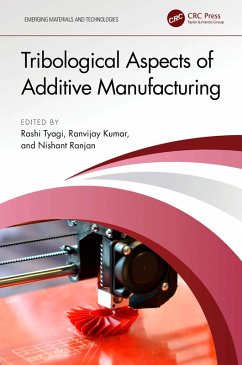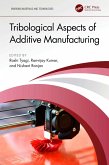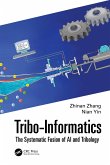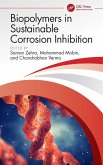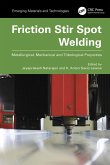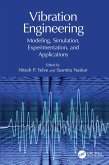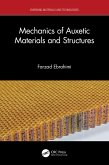Tribological Aspects of Additive Manufacturing (eBook, PDF)
Redaktion: Tyagi, Rashi; Ranjan, Nishant; Kumar, Ranvijay
171,95 €
171,95 €
inkl. MwSt.
Sofort per Download lieferbar

86 °P sammeln
171,95 €
Als Download kaufen

171,95 €
inkl. MwSt.
Sofort per Download lieferbar

86 °P sammeln
Jetzt verschenken
Alle Infos zum eBook verschenken
171,95 €
inkl. MwSt.
Sofort per Download lieferbar
Alle Infos zum eBook verschenken

86 °P sammeln
Tribological Aspects of Additive Manufacturing (eBook, PDF)
Redaktion: Tyagi, Rashi; Ranjan, Nishant; Kumar, Ranvijay
- Format: PDF
- Merkliste
- Auf die Merkliste
- Bewerten Bewerten
- Teilen
- Produkt teilen
- Produkterinnerung
- Produkterinnerung

Bitte loggen Sie sich zunächst in Ihr Kundenkonto ein oder registrieren Sie sich bei
bücher.de, um das eBook-Abo tolino select nutzen zu können.
Hier können Sie sich einloggen
Hier können Sie sich einloggen
Sie sind bereits eingeloggt. Klicken Sie auf 2. tolino select Abo, um fortzufahren.

Bitte loggen Sie sich zunächst in Ihr Kundenkonto ein oder registrieren Sie sich bei bücher.de, um das eBook-Abo tolino select nutzen zu können.
Tribological Aspects of Additive Manufacturing provides a technical discussion on the roles of the 3D printing process for processing polymeric-, metallic-, and ceramics-based additive manufactured products in order to improve the tribological properties. It explores design flexibility, waste minimization, and cost reduction.
- Geräte: PC
- mit Kopierschutz
- eBook Hilfe
Andere Kunden interessierten sich auch für
![Tribological Aspects of Additive Manufacturing (eBook, ePUB) Tribological Aspects of Additive Manufacturing (eBook, ePUB)]() Tribological Aspects of Additive Manufacturing (eBook, ePUB)171,95 €
Tribological Aspects of Additive Manufacturing (eBook, ePUB)171,95 €![Tribo-Informatics (eBook, PDF) Tribo-Informatics (eBook, PDF)]() Zhinan ZhangTribo-Informatics (eBook, PDF)97,95 €
Zhinan ZhangTribo-Informatics (eBook, PDF)97,95 €![Biopolymers in Sustainable Corrosion Inhibition (eBook, PDF) Biopolymers in Sustainable Corrosion Inhibition (eBook, PDF)]() Biopolymers in Sustainable Corrosion Inhibition (eBook, PDF)176,95 €
Biopolymers in Sustainable Corrosion Inhibition (eBook, PDF)176,95 €![Friction Stir Spot Welding (eBook, PDF) Friction Stir Spot Welding (eBook, PDF)]() Friction Stir Spot Welding (eBook, PDF)125,95 €
Friction Stir Spot Welding (eBook, PDF)125,95 €![Vibration Engineering (eBook, PDF) Vibration Engineering (eBook, PDF)]() Vibration Engineering (eBook, PDF)103,95 €
Vibration Engineering (eBook, PDF)103,95 €![Sustainable Technologies for Energy Efficient Buildings (eBook, PDF) Sustainable Technologies for Energy Efficient Buildings (eBook, PDF)]() Sustainable Technologies for Energy Efficient Buildings (eBook, PDF)171,95 €
Sustainable Technologies for Energy Efficient Buildings (eBook, PDF)171,95 €![Mechanics of Auxetic Materials and Structures (eBook, PDF) Mechanics of Auxetic Materials and Structures (eBook, PDF)]() Farzad EbrahimiMechanics of Auxetic Materials and Structures (eBook, PDF)51,95 €
Farzad EbrahimiMechanics of Auxetic Materials and Structures (eBook, PDF)51,95 €-
-
-
Tribological Aspects of Additive Manufacturing provides a technical discussion on the roles of the 3D printing process for processing polymeric-, metallic-, and ceramics-based additive manufactured products in order to improve the tribological properties. It explores design flexibility, waste minimization, and cost reduction.
Dieser Download kann aus rechtlichen Gründen nur mit Rechnungsadresse in A, B, BG, CY, CZ, D, DK, EW, E, FIN, F, GR, HR, H, IRL, I, LT, L, LR, M, NL, PL, P, R, S, SLO, SK ausgeliefert werden.
Produktdetails
- Produktdetails
- Verlag: Taylor & Francis eBooks
- Seitenzahl: 252
- Erscheinungstermin: 25. April 2024
- Englisch
- ISBN-13: 9781040005651
- Artikelnr.: 70135226
- Verlag: Taylor & Francis eBooks
- Seitenzahl: 252
- Erscheinungstermin: 25. April 2024
- Englisch
- ISBN-13: 9781040005651
- Artikelnr.: 70135226
- Herstellerkennzeichnung Die Herstellerinformationen sind derzeit nicht verfügbar.
Dr. Rashi Tyagi is currently working as an assistant professor in University Centre for Research and Development at Chandigarh University. Dr. Tyagi has won CII MILCA AWARD in the field of tribology of electrical discharge coating in 2022. She has completed her PhD in mechanical engineering from the Indian Institute of Technology (Indian school of mines), Dhanbad, India. Her PhD work was focused on surface modification by an electrical discharge process for solid lubrication and enhanced tribological performance. She has completed her MTech from IIT(ISM), Dhanbad, India. She has done her MTech project on the fiber laser cladding of TiN+SS 304 powder to enhance tribological performance. She has published over 21 SCI articles in peer-reviewed international journals, conference proceedings, and book chapters as a first author in the field of 3D printing and tribology of coatings. She has published two articles in Tribology International. She is also a reviewer in several SCI and Scopus indexed journals. She is currently working on tribology of fiber reinforce composite prepared by fused filament fabrication, fused deposition modeling, thermoplastic polymers, and natural and synthetic composites. Dr. Ranvijay Kumar is an assistant professor in University Centre for Research and Development, Chandigarh University. He has received a PhD in mechanical engineering from Punjabi University, Patiala. Additive manufacturing, shape memory polymers, smart materials, friction-based welding techniques, advance materials processing, polymer matrix composite preparations, reinforced polymer composites for 3D printing, plastic solid waste management, thermosetting recycling, and destructive testing of materials are the skills of Dr. Kumar. He has won prestigious CII MILCA award 2020. He has co-authored more than 55 research papers in science citation indexed journals and 38 book chapters and has presented 20 research papers in various national/international level conferences. He has contributed extensively in Additive Manufacturing literature with publications appearing in the Journal of Manufacturing Processes, Composite Part: B, Rapid Prototyping Journal, the Journal of Thermoplastic Composite Materials, Measurement, Proceedings of the Institution of Mechanical Engineers, Part C(iMeche Part C), Proceedings of the Institution of Mechanical Engineers, Part H: Journal of Engineering in Medicine, the Journal of Thermoplastic Composite Materials, Materials Research Express, Proceedings of the National Academy of Sciences, India Section A: Physical Sciences, the Journal of Central South University, the Journal of the Brazilian Society of Mechanical Sciences and Engineering, Composite Structures, CIRP Journal of Manufacturing Science and Technology, etc. He is the editor of book Additive Manufacturing for Plastic Recycling: Efforts in Boosting A Circular Economy publishing in CRC Press (Taylor and Francis). Dr. Nishant Ranjan is working as Assistant Professor at the University Centre for Research and Development of Chandigarh University. Fused deposition modeling; extrusion; thermoplastic polymers; composition of thermoplastic polymers; natural and synthetic biopolymers; scaffolds printing; 3D printing technology; thermal, mechanical, morphological, and chemical properties of thermoplastic polymers; biocompatible and biodegradable fillers; and reinforcement of materials are the main focused area of Dr. Nishant Ranjan. He has co-authored more than 20 research papers in science citation indexed journal, 1 book, and 27 book chapters and has presented 14 research papers in various international/national level conferences. He has been reviewing research articles of various peer-reviewed SCI and Scopus indexed journals.
1. Tribological Study of 3D-Printed Thermoplastic Polymers. 2.
Investigation on Tribology of Additively Manufactured Metal Part. 3.
Tribological Properties of Polymer-Reinforced Matrix Composite Prepared by
Additive Manufacturing. 4. Tribocorrosion Properties of Additively
Manufactured Parts. 5. Future Trends in Laser Powder Bed Fusion Process for
Tribological Applications. 6. Role of Natural Fiber-Based Composite on Wear
and Friction Resistance. 7. Study on the Effect of Carbon Fiber-Reinforced
Composites on Tribological Properties. 8. Impact of 3D Printing Process
Parameters on Tribological Behaviour of Polymers. 9. Effect of the
Tribological Properties on Structural Applications of 3D-Printed
Thermoplastic Composites. 10. Effect of Surface Texturing on Tribological
Behaviour of Additively Manufactured Parts. 11. Trends of Tribology in
Biomedical Application of Additively Manufactured Parts. 12. Tribological
Effect of 3D Printing in Industrial Applications. 13. Emerging Applications
of 3D-Printed Parts with Enhanced Tribological Properties.
Investigation on Tribology of Additively Manufactured Metal Part. 3.
Tribological Properties of Polymer-Reinforced Matrix Composite Prepared by
Additive Manufacturing. 4. Tribocorrosion Properties of Additively
Manufactured Parts. 5. Future Trends in Laser Powder Bed Fusion Process for
Tribological Applications. 6. Role of Natural Fiber-Based Composite on Wear
and Friction Resistance. 7. Study on the Effect of Carbon Fiber-Reinforced
Composites on Tribological Properties. 8. Impact of 3D Printing Process
Parameters on Tribological Behaviour of Polymers. 9. Effect of the
Tribological Properties on Structural Applications of 3D-Printed
Thermoplastic Composites. 10. Effect of Surface Texturing on Tribological
Behaviour of Additively Manufactured Parts. 11. Trends of Tribology in
Biomedical Application of Additively Manufactured Parts. 12. Tribological
Effect of 3D Printing in Industrial Applications. 13. Emerging Applications
of 3D-Printed Parts with Enhanced Tribological Properties.
1. Tribological Study of 3D-Printed Thermoplastic Polymers. 2.
Investigation on Tribology of Additively Manufactured Metal Part. 3.
Tribological Properties of Polymer-Reinforced Matrix Composite Prepared by
Additive Manufacturing. 4. Tribocorrosion Properties of Additively
Manufactured Parts. 5. Future Trends in Laser Powder Bed Fusion Process for
Tribological Applications. 6. Role of Natural Fiber-Based Composite on Wear
and Friction Resistance. 7. Study on the Effect of Carbon Fiber-Reinforced
Composites on Tribological Properties. 8. Impact of 3D Printing Process
Parameters on Tribological Behaviour of Polymers. 9. Effect of the
Tribological Properties on Structural Applications of 3D-Printed
Thermoplastic Composites. 10. Effect of Surface Texturing on Tribological
Behaviour of Additively Manufactured Parts. 11. Trends of Tribology in
Biomedical Application of Additively Manufactured Parts. 12. Tribological
Effect of 3D Printing in Industrial Applications. 13. Emerging Applications
of 3D-Printed Parts with Enhanced Tribological Properties.
Investigation on Tribology of Additively Manufactured Metal Part. 3.
Tribological Properties of Polymer-Reinforced Matrix Composite Prepared by
Additive Manufacturing. 4. Tribocorrosion Properties of Additively
Manufactured Parts. 5. Future Trends in Laser Powder Bed Fusion Process for
Tribological Applications. 6. Role of Natural Fiber-Based Composite on Wear
and Friction Resistance. 7. Study on the Effect of Carbon Fiber-Reinforced
Composites on Tribological Properties. 8. Impact of 3D Printing Process
Parameters on Tribological Behaviour of Polymers. 9. Effect of the
Tribological Properties on Structural Applications of 3D-Printed
Thermoplastic Composites. 10. Effect of Surface Texturing on Tribological
Behaviour of Additively Manufactured Parts. 11. Trends of Tribology in
Biomedical Application of Additively Manufactured Parts. 12. Tribological
Effect of 3D Printing in Industrial Applications. 13. Emerging Applications
of 3D-Printed Parts with Enhanced Tribological Properties.
